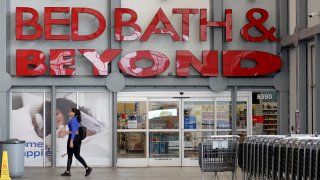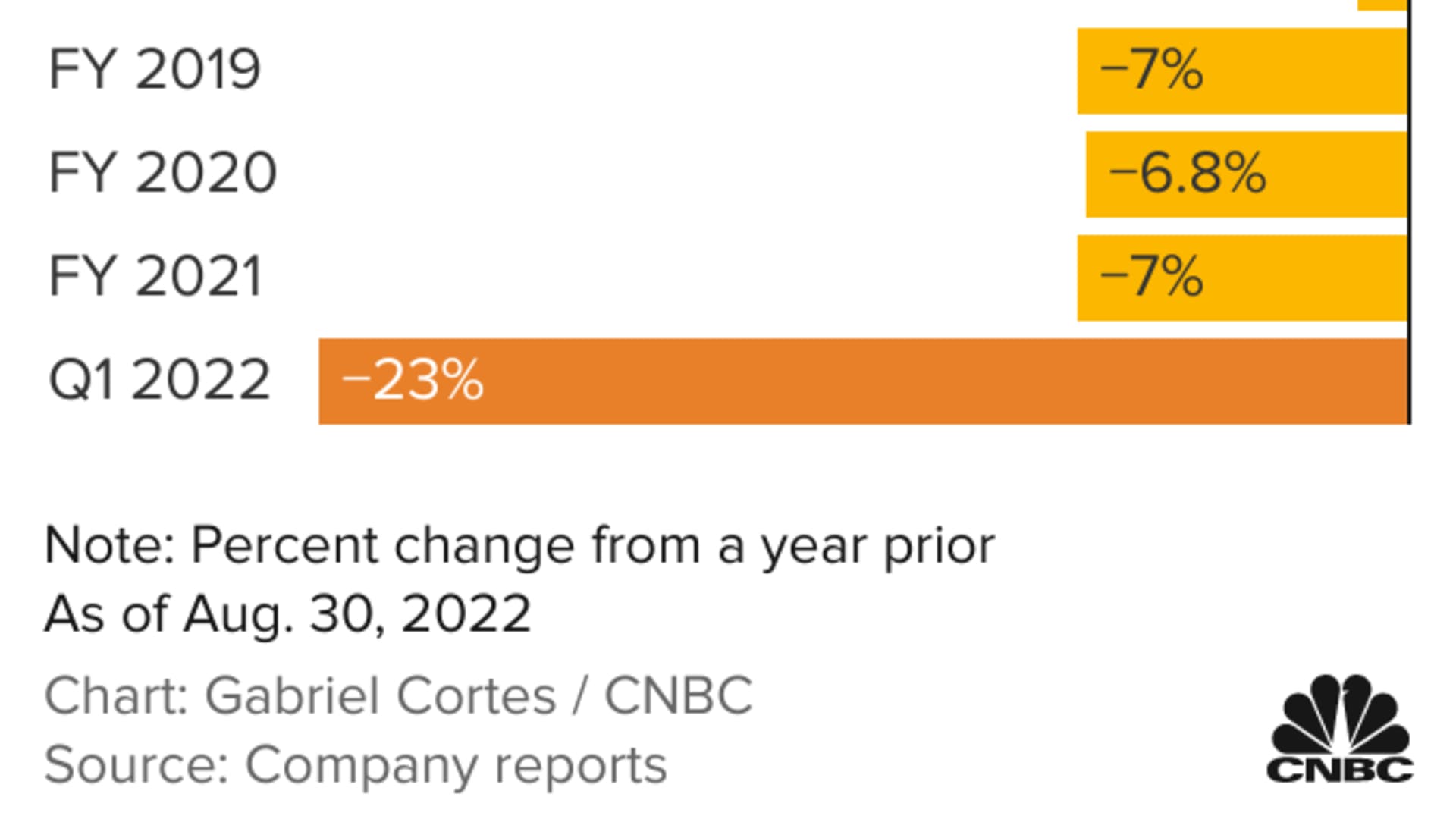
- Bed Bath & Beyond said it secured more than $500 million in new financing as it seeks to steady its business.
- It also announced store closures and layoffs as a way to cut costs.
- The struggling retailer will also overhaul its product mix to win back customers.
Bed Bath & Beyond on Wednesday announced swift and significant steps it is taking to try to revive its struggling business, including layoffs, store closures and a shake-up of the brands on its shelves.
On a call with investors, the New Jersey-based retailer laid out details of its latest turnaround push. It said it has started closing about 150 of its "lower producing" namesake stores. It will also slash costs by shrinking head count by about 20% across its corporate and supply chain workforce. To strengthen its balance sheet, the company said it secured more than $500 million in new financing, including a loan.
The moves are urgently needed for the troubled retailer, which also disclosed Wednesday that slowing sales have carried into the most recent quarter. Same-store sales plummeted 26% for the three-month period ended Aug. 27 — an even steeper drop than the declines of recent quarters.
Bed Bath's shares closed down 21% at $9.53 Wednesday.
Its business had already taken many blows. The company said it lost hundreds of millions of dollars in sales because it didn't have items in stock. It was publicly criticized by activist investor Ryan Cohen, who later sold off his entire stake in the company. Former CEO Mark Tritton, who was chosen to carve out a successful strategy, was ousted by the board in June.
Money Report
Yet the company said its new approach can win back shoppers who have strayed to competitors.
"There is still an incredible degree of love for Bed Bath & Beyond," said Mara Sirhal, the newly named brand president of Bed Bath & Beyond. "We must get back to our rightful place as the home category destination, and our goal is to achieve this by leading with the product and brands our customers want."
Feeling out of the loop? We'll catch you up on the Chicago news you need to know. Sign up for the weekly> Chicago Catch-Up newsletter.
For its baby goods chain, Buybuy Baby, the company also named Patty Wu as brand president.
Steadying its balance sheet
One of Bed Bath's crucial moves was finding a way to pay the bills and stabilize relationships with suppliers leery of working with a faltering company. It counts on those vendors to stock shelves and warehouses — especially during important seasons like back to college and the Christmas season.
Bed Bath has burned through cash, ending May with about $100 million compared with $1.1 billion a year earlier.
It said Wednesday it has a plan to cut costs and gain additional cash. It secured a $375 million loan through Sixth Street Partners, a lender that has provided financing to other retailers including J.C. Penney and Designer Brands. It has expanded $1.13 billion asset-backed revolving credit facility, too.
Earlier in the day, it said in a filing that it will sell an undisclosed amount of shares.
Along with the additional financing, it is slashing costs. Its store footprint will get about 16% smaller with the closures. As of late May, the company had 955 stores. That includes 769 namesake stores, 135 Buybuy Baby stores and 51 stores under its Harmon or Face Values brands.
Bed Bath also said it is eliminating the jobs of chief operating officer and chief stores officer.

Merchandise overhaul
To try to stand out from competitors, Bed Bath previously made an aggressive push into private-label products and launched nine exclusive brands since the spring of 2021. Yet instead of drumming up more sales, some shoppers felt disoriented by the unfamiliar names showcased prominently in store displays and had trouble finding the national brands they wanted.
Now, Bed Bath will backpedal from that approach and bring back more of the name brands that people recognize, such as Calphalon, Cuisinart and Oxo, Sirhal said. It will discontinue three of its private-label brands − Haven, Wild Sage and Studio 3B − and significantly reduce the inventory of the others, she said.
She said it will also work with national brands to develop exclusive products and add more direct-to-consumer brands.
On the Buybuy Baby side, Wu said the baby goods chain wants to build on its brand and differentiate by becoming the go-to retailer and advisor for parents and families.
"If you think about how parents used to rely on volumes of heavy books to learn about what to expect, we're here to help new parents who are digitally savvy and native and who rely on their smartphones for everyday living," she said.
In stores and online, Wu said it will demonstrate products, provide recommendations and build a community that parents can turn to for advice from pregnancy to early preschool years. Buybuy Baby is also seeking new standout products and automatically enrolling parents with a baby registry in its loyalty program, she said.
Bed Bath's shares have been on a meme stock-fueled roller-coaster ride for months, rocketing up to $30.06 and falling to a low of $4.38 in the past year. As of Tuesday's close of $12.11, the shares are down about 17% year to date.
Read the company's news release here.






